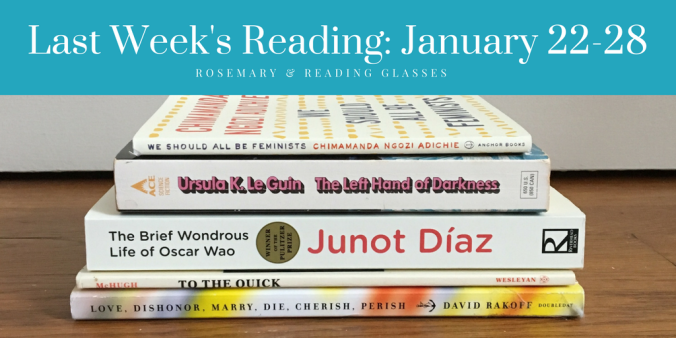
We Should All Be Feminists, by Chimamanda Ngozie Adichie: The perfect primer on feminism, eloquent and brief. This would make an excellent gift for high school students in need of a brief introduction to the concept and will rally, I think, those who hesitate to call themselves feminists.
The Left Hand of Darkness, by Ursula K. Le Guin: I’ve had this 1969 sci-fi classic on my shelves for twenty years, but I’m rather glad I didn’t read it at twelve. Though short—my mass-market paperback is 300 pages—it’s dense, complicated, and incredibly intelligent. Genly Ai is an envoy from a group of planets (think the Federation, but more abstract) assigned to persuade the inhabitants of the planet Gethen (translated, it means Winter–it’s essentially a populated Hoth) to join the Ekumen. Gethenians have a complicated system of etiquette and honor called shifgrethor, but even more confounding for Ai is their lacked of fixed sexuality; they are neither male nor female (all characters are called “he,” a convention Ann Leckie reverses in the excellent Ancillary Justice). The world-building is sublime, the pace of revelation superb–we struggle to understand this culture as Genly does, and in the process Ms. Le Guin asks us to think deeply about exploration, friendship, and patriotism. Highly recommended.
Love, Dishonor, Marry, Die, Cherish, Perish, by David Rakoff: The world lost a funny, sad voice when David Rakoff died in 2012 at the age of 47. If you loved his essay collection Fraud (I did), you’ll find this book quite different–it’s a short novel made of vignettes in verse. It’s grim and witty at the same time, a catalogue of cruelties and kindnesses and most of all, I think, our vulnerabilities. Those looking for an unusual reading experience should pick it up.
The Brief Wondrous Life of Oscar Wao, by Junot Díaz: Deserves every accolade it’s received, and then some. I put off reading this novel because I have limited patience for the male bildungsroman, but my expectations were confounded. Oscar is lovable and tragic, but the story doesn’t belong to him alone; Mr. Díaz takes long excursions into the backgrounds of his mother and sister, giving the book a roundedness and depth I didn’t anticipate. Yunior, the narrator and sometime authorial-alter-ego, is a fantastic narrator, steeped in nerd culture, frenetic, profane and and so full of life that it seems he’s physically propelling words across the page (even in the footnotes). I loved, loved, loved this novel.
To The Quick, by Heather McHugh: Heather McHugh’s wordplay (see “Etymological Dirge”) is fantastic, almost dizzying. This 1987 collection is beautiful and smart and tough. These poems will cut you to the quick. Need proof? Just read “The Amenities.”
Advertisements Share this:




